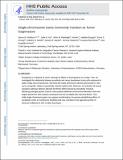| dc.contributor.author | Chung, Erica S. | |
| dc.contributor.author | Sayles, Nicole M. | |
| dc.contributor.author | Passerini, Verena | |
| dc.contributor.author | Storchova, Zuzana | |
| dc.contributor.author | Sheltzer, Jason Meyer | |
| dc.contributor.author | Ko, Julie H. | |
| dc.contributor.author | Replogle, John Michael | |
| dc.contributor.author | Habibe Burgos, Nicole C. | |
| dc.contributor.author | Meehl, Colleen M. | |
| dc.contributor.author | Amon, Angelika B. | |
| dc.date.accessioned | 2018-06-06T18:42:19Z | |
| dc.date.available | 2018-06-06T18:42:19Z | |
| dc.date.issued | 2017-01 | |
| dc.date.submitted | 2016-10 | |
| dc.identifier.issn | 1535-6108 | |
| dc.identifier.uri | http://hdl.handle.net/1721.1/116154 | |
| dc.description.abstract | Aneuploidy is a hallmark of cancer, although its effects on tumorigenesis are unclear. Here, we investigated the relationship between aneuploidy and cancer development using cells engineered to harbor single extra chromosomes. We found that nearly all trisomic cell lines grew poorly in vitro and as xenografts, relative to genetically matched euploid cells. Moreover, the activation of several oncogenic pathways failed to alleviate the fitness defect induced by aneuploidy. However, following prolonged growth, trisomic cells acquired additional chromosomal alterations that were largely absent from their euploid counterparts and that correlated with improved fitness. Thus, while single-chromosome gains can suppress transformation, the genome-destabilizing effects of aneuploidy confer an evolutionary flexibility that may contribute to the aggressive growth of advanced malignancies with complex karyotypes.Keywords:
aneuploidy; genome dosage imbalance; genomic instability; transformation; chromosomal instability | en_US |
| dc.publisher | Elsevier BV | en_US |
| dc.relation.isversionof | http://dx.doi.org/10.1016/J.CCELL.2016.12.004 | en_US |
| dc.rights | Creative Commons Attribution-NonCommercial-NoDerivs License | en_US |
| dc.rights.uri | http://creativecommons.org/licenses/by-nc-nd/4.0/ | en_US |
| dc.source | PMC | en_US |
| dc.title | Single-chromosome Gains Commonly Function as Tumor Suppressors | en_US |
| dc.type | Article | en_US |
| dc.identifier.citation | Sheltzer, Jason M. et al. “Single-Chromosome Gains Commonly Function as Tumor Suppressors.” Cancer Cell 31, 2 (February 2017): 240–255 © 2017 Elsevier Inc | en_US |
| dc.contributor.department | Massachusetts Institute of Technology. Department of Biology | en_US |
| dc.contributor.department | Koch Institute for Integrative Cancer Research at MIT | en_US |
| dc.contributor.mitauthor | Sheltzer, Jason Meyer | |
| dc.contributor.mitauthor | Ko, Julie H. | |
| dc.contributor.mitauthor | Replogle, John Michael | |
| dc.contributor.mitauthor | Habibe Burgos, Nicole C. | |
| dc.contributor.mitauthor | Meehl, Colleen M. | |
| dc.contributor.mitauthor | Amon, Angelika B. | |
| dc.relation.journal | Cancer Cell | en_US |
| dc.eprint.version | Author's final manuscript | en_US |
| dc.type.uri | http://purl.org/eprint/type/JournalArticle | en_US |
| eprint.status | http://purl.org/eprint/status/PeerReviewed | en_US |
| dc.date.updated | 2018-06-05T16:32:36Z | |
| dspace.orderedauthors | Sheltzer, Jason M.; Ko, Julie H.; Replogle, John M.; Habibe Burgos, Nicole C.; Chung, Erica S.; Meehl, Colleen M.; Sayles, Nicole M.; Passerini, Verena; Storchova, Zuzana; Amon, Angelika | en_US |
| dspace.embargo.terms | N | en_US |
| dc.identifier.orcid | https://orcid.org/0000-0003-1381-1323 | |
| dc.identifier.orcid | https://orcid.org/0000-0003-2735-8195 | |
| mit.license | PUBLISHER_CC | en_US |
